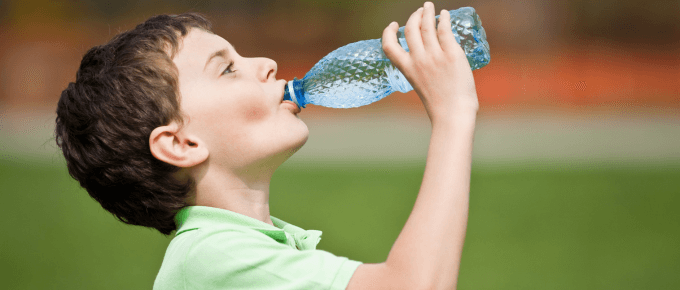Raise your hand if you’ve ever thought, “Why does my bottled water taste like a failed science experiment?” Yeah, me too. And no one wants a strange taste while they’re trying to quench their thirst. This blog post will help you understand why does my bottled water taste weird and, more importantly, how to make sure that every sip is a tasty celebration of staying hydrated. So grab a bottle, settle in, and let’s solve the mystery of strange-tasting water!
Will it be Mineral Madness or Plastic Tango? Identifying the Perps
- Plastic Posse:
A tiny plastic indication may be nothing to be concerned about, only a polite greeting from the bottle itself. However, an unpleasant, lasting aftertaste signals leaching chemicals, particularly in older or damaged bottles. Play it safe and say “adios” to the eccentric bottle. - Mineral Mumbo Jumbo:
A high mineral concentration, particularly magnesium or iron, can impart a harsh taste to your water. It isn’t necessarily toxic, but your taste buds may not allow it. For a smoother sip, try different brands or switch to filtered water. - Bacteria Boogie: Bacteria can live in reusable bottles and make things smell and taste bad. Regular cleaning with hot, soapy water, vinegar rinses, and thorough drying are essential for getting rid of bacteria. If cleaning does not work, consider replacing the bottle.
A Serious Question: What Happens When Plastic Goes Rogue?
Have you ever taken a drink and tasted the faint echoes of a campfire? This burnt-plastic odor is a warning sign that you have been exposed to severe heat (think scorched vehicle seats or a forgotten beach cooler). Avoid exposing bottles to heat, and remember that plastic does not appreciate sunbathing.
Beyond the Taste: Why Is It Important to Avoid Funky Water?
It’s not just about your palate. Weird-tasting water frequently indicates underlying issues:
- Health Issues:
Chemical leaching, bacterial development, or even expired water can all be hazardous to one’s health. Take precautions, and if something smells or tastes bad, say, “No thanks.” - Environmental Concerns:
Bottled water contributes significantly to plastic pollution. Consider environmentally responsible alternatives, such as reusable bottles and filters, for a more sustainable sip.
The Great Hydration Debate: Tap vs. Bottle Showdown
The answer depends on the quality of your local water. If your tap water is safe and tasty, go for the green choice! If the water is suspect, a good filter or a respected bottled water brand can be your hydration heroes.
Is it bad if bottled water tastes like plastic?
There may be no need to worry about a faint plastic smell; it is probably just the bottle giving off gas. A strong, persistent plastic aftertaste, on the other hand, could suggest leaching chemicals, especially in older or damaged bottles. If the flavor is strong, play it safe and discard the bottle.
Why does my reusable plastic water bottle taste weird?
If your reusable bottle smells or tastes off, it’s most likely due to bacterial growth. The solutions are regular cleaning with hot soapy water, vinegar rinses, and thorough drying. If these steps fail to solve the problem, consider replacing the bottle.
Is it okay to drink water that smells like plastic?
A slight plastic stench is tolerable, but a strong chemical odor is a red flag. It could be the result of leaching chemicals or bacterial development. Therefore, it’s better to avoid drinking it.
Why does bottled water taste bitter to me?
A high mineral concentration, specifically magnesium or iron, may be the cause of a bitter taste. While it is generally harmless, it may not be your tastebuds’ best friend. If the bitterness is too strong, try another brand or switch to filtered water.
Why does my bottled water smell like burnt plastic?
This smell suggests that it was exposed to very high temperatures, possibly while it was being stored or transported. This can affect the plastic and possibly leach chemicals into the water. Avoid exposing bottled water to high heat by ditching the bottle. Get rid of the bottle and prevent exposing bottled water to high heat.
Can I drink bottled water that smells bad?
There is a chance that something is contaminated or that germs are growing when you smell something unpleasant, like a chemical or rotten egg. Stay away from this kind of water, and either buy a good water filter or use tap water if you can.
Why should we stop drinking bottled water?
Bottled water contributes to plastic pollution and waste in addition to weird flavours. Consider eco-friendly options such as reusable bottles and water filters for a long-lasting and tasty hydration solution.
Which is better, tap or bottled water?
There are eco-friendly ways to stay hydrated, like using reusable bottles and water filters.
Is it preferable to drink tap water or bottled water?
The answer is dependent on the quality of your local water. If your tap water is safe and tastes nice, it is a more environmentally friendly and cost-effective option. If your tap water is suspect, a decent filter or a renowned bottled water brand may be a viable solution.
Which plastic bottles are not safe?

If you are concerned about chemicals, avoid bottles labelled #7 (BPA) or #1 (PET). Choose bottles branded #2 (HDPE) or #5 (PP), which are regarded as safer options. Remember that even “safe” plastics can leach chemicals when heated to severe temperatures, so handle your water bottles with caution.
Be mindful that you are not the only one who experiences the familiar plastic tango as you raise your bottle. Everyone has had stinky water at some point, but it doesn’t have to be your life.



Leave a Reply